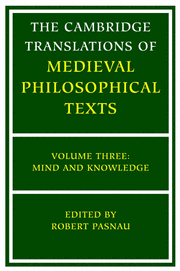Book contents
- Frontmatter
- Contents
- Acknowledgments
- General Introduction
- 1 ANONYMOUS (Arts Master c. 1225) The Soul and Its Powers
- 2 ANONYMOUS (Arts Master c. 1270) Questions on De anima I–II
- 3 BONAVENTURE Christ Our One Teacher
- 4 HENRY OF GHENT Can a Human Being Know Anything?
- 5 HENRY OF GHENT Can a Human Being Know Anything without Divine Illumination?
- 6 PETER JOHN OLIVI The Mental Word
- 7 WILLIAM ALNWICK Intelligible Being
- 8 PETER AUREOL Intuition, Abstraction, and Demonstrative Knowledge
- 9 WILLIAM OCKHAM Apparent Being
- 10 WILLIAM CRATHORN On the Possibility of Infallible Knowledge
- 11 ROBERT HOLCOT Can God Know More than He Knows?
- 12 ADAM WODEHAM The Objects of Knowledge
- Textual Emendations
- Bibliography
- Index
8 - PETER AUREOL Intuition, Abstraction, and Demonstrative Knowledge
Published online by Cambridge University Press: 23 December 2009
- Frontmatter
- Contents
- Acknowledgments
- General Introduction
- 1 ANONYMOUS (Arts Master c. 1225) The Soul and Its Powers
- 2 ANONYMOUS (Arts Master c. 1270) Questions on De anima I–II
- 3 BONAVENTURE Christ Our One Teacher
- 4 HENRY OF GHENT Can a Human Being Know Anything?
- 5 HENRY OF GHENT Can a Human Being Know Anything without Divine Illumination?
- 6 PETER JOHN OLIVI The Mental Word
- 7 WILLIAM ALNWICK Intelligible Being
- 8 PETER AUREOL Intuition, Abstraction, and Demonstrative Knowledge
- 9 WILLIAM OCKHAM Apparent Being
- 10 WILLIAM CRATHORN On the Possibility of Infallible Knowledge
- 11 ROBERT HOLCOT Can God Know More than He Knows?
- 12 ADAM WODEHAM The Objects of Knowledge
- Textual Emendations
- Bibliography
- Index
Summary
Introduction
Peter Aureol (c. 1280–1322) was one of the most influential and original philosophers of the early fourteenth century. A member of the Franciscan order, Aureol became a master of theology at the University of Paris in 1318. The following selection is taken from the prologue to his major work, his commentary on Lombard's Sentences.
The official topic of this question concerns divine illumination: specifically, whether God could illuminate someone in this life with the articles of faith in such a way that this individual would have knowledge of these propositions. On its face, this might seem unlikely, because such articles – regarding the incarnation, the Trinity, etc. – are supposed to be held by faith alone in this life. (In the next life, in the “light of glory,” matters will be quite different.) But Aureol wants to know whether it would be possible, if only in principle, for God to provide illumination that would provide a “wayfarer” (someone in this life) not just with a stronger faith, but with genuine knowledge. Aureol accepts the standard medieval account of knowledge (scientia) as requiring a demonstrative proof. (To stress this point, we sometimes translate scientia as “demonstrative knowledge.”) So the present question raises the problem of whether illumination could conceivably supply this sort of demonstrative evidence. In other words, could someone granted illumination in this life ever prove the mysteries of the faith? Aureol's answer is Yes.
Although the question is cast in terms of divine illumination, Aureol's real interest is in the nature of knowledge. In the course of his affirmative answer, Aureol has to distinguish knowledge from faith.
- Type
- Chapter
- Information
- The Cambridge Translations of Medieval Philosophical Texts , pp. 178 - 218Publisher: Cambridge University PressPrint publication year: 2002

